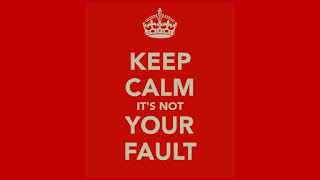It’s
Not Your Fault, But…
Its’s not mine, either.
When something goes wrong, whether at work or home,
most people immediately start casting around for somebody to blame.
Over the weekend, I was reading and drinking a cup
of coffee which was perched on the arm of the couch. I do this daily, and have never spilled
it. My daughter came into the room, I
put my reader down next to me and we started chatting. A little later, I picked the reader up,
turned to my coffee, and knocked it over.
Something in my expression caused her to ask whether it was her
fault. Of course, it wasn’t, but a mean,
small part of me was thinking, well, no, but if you hadn’t come in the room… And she was kind enough to help me clear it
up!
If that lamp post wasn’t there
If that faster person wasn’t in the race
If the traffic light hadn’t turned red at just that
moment
If we hadn’t hired Joe, I would have got the
promotion
If, if, if…..
We are very quick to accept the “if” when it is
about us, and much slower to do so when it’s about other people’s mistakes.
Watching Hillary Clinton recently saying she was
personally responsible for losing the election, but mentioned the Comey letter
and Russian interference in the last 10 days as having an impact. Some will agree, some will say “Maybe, but it
must have been teetering on the edge if those two events made such a
significant difference, so stop with the excuses”.
The question is are you taking full responsibility
if you are giving reasons for why it went wrong?
Unfortunately, reasons are often perceived as excuses.
Multiple management conferences, workshops and
forums are centred around Accountability and Responsibility as key to business
success and yet business culture often informs against people feeling confident
that the reasons will be heard objectively.
It is important to create an environment in business
where people feel comfortable explaining why a situation went horribly wrong or
wonderfully right.
At Accsys we introduced the (admittedly poorly named)
“Autopsy” concept, where we analyse projects on completion. This gives us the opportunity to openly
discuss what went right and what went wrong in a structured, non-judgemental
forum.
Part of our thinking was that while we do learn from
of our mistakes because everybody is talking about them during the whole crisis
management process, we don’t grow enough from our successes because they are
off the crisis radar.
We also make a point of starting all formal meetings
with the successes of the recent past directly relating to the specific
meeting.
Repeating success is, quite simply, the strongest
motivator and driver of great behaviour.
Links,
References and Notes
Accsys provides people management solutions ie Payroll, Human Resources (HR), Time and Attendance as well as Access Control/Visitor Management.
The company develops, implements,
trains and services our solutions. We
provide readers, turnstiles, booms and CCTV.
We run both on premise and in the
cloud, as well as mobile options for ESS.
Recruitment, online education and Business Process Outsourcing (BPO) are
part of our offering, too.
http://www.accsys.co.za/accsys-peopleplace-talent-management
email:
tschroenn@accsys.co.za
twitter:
@TerylSchroenn
Note:
Thank you for reading Teryl@Work.
Should you wish to use any of the material, please acknowledge this blog
as the source.

Comments
Post a Comment